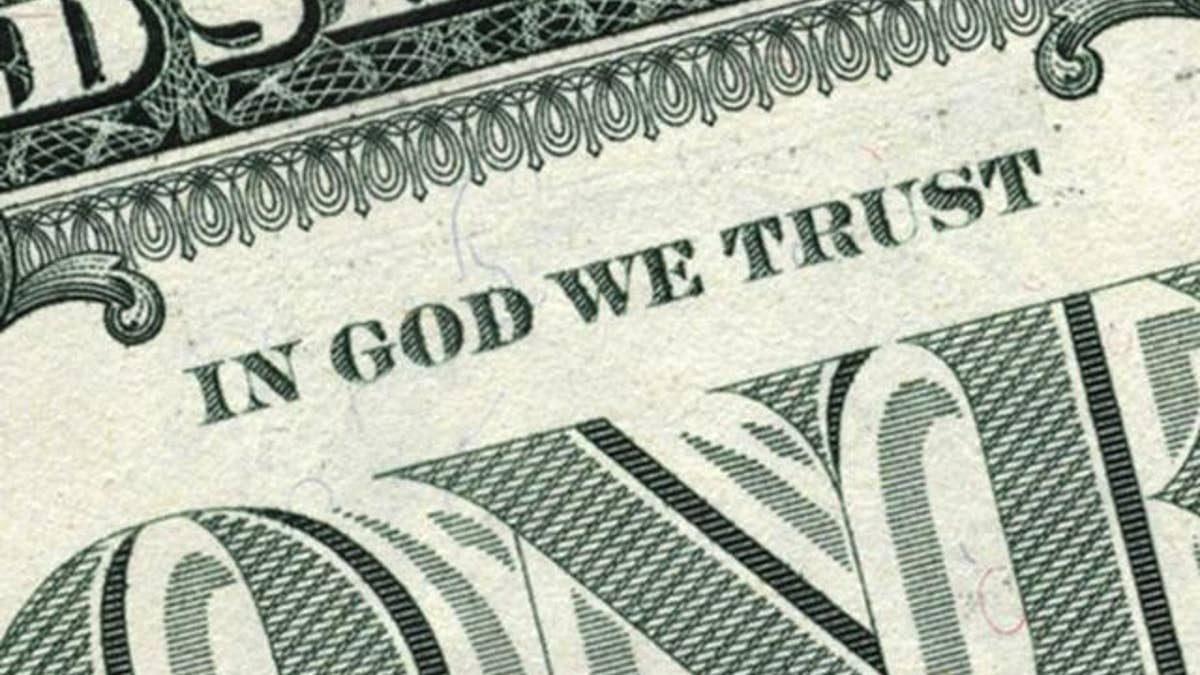
The Republican-led House approved a resolution Tuesday night to reaffirm the slogan as the country's motto and encourage the public display of it in all public buildings, public schools and other government institutions.
There are many issues right now dominating the headlines: Presidential debates...The rising fear of terrorism....Growing concern about the economy.
With all that news, you may have missed this headline: “Lawsuit demands U.S. remove ‘In God We Trust’ from money.”
That’s right. A federal lawsuit has been filed to remove our national motto – ‘In God We Trust’ – from the currency. If this sounds familiar, it should. This is not the first time that challenge has been made.
In fact, dedicated atheist Michael Newdow, who is representing 41 plaintiffs in this suit filed in Ohio, is a veteran litigator who repeatedly has gone to court to remove ‘In God We Trust’ from our culture. More about that in a moment.
In this new filing, Newdow – and those he represents – are apparently so offended by the use of the word “God” – that they can’t even bring themselves to spell it out in the lawsuit. The hundreds of references to “God” in the lawsuit are spelled “G-d.”
The national motto concerns them so much that a key part of their legal argument in asking the court to remove ‘In God We Trust’ from the currency, is that the phrase violates the separation of church and state and creates a pro-Christian, and anti-atheist sentiment in the nation.
“The ‘In G-d We Trust’ phrase has continued to be a tool used to perpetuate favoritism for (Christian) Monotheism,” the suit contends. “It has also continued to perpetuate anti-Atheistic bias.”
This argument is deeply flawed and ridiculous. It simply represents another attempt to attack our religious heritage.
The truth is the fate of this new lawsuit is likely to end up the way earlier attempts to remove the national motto did. It is destined to fail.
Here’s why.
Our nation’s history is replete with examples of acknowledgment of religious belief in the public sector, and the Supreme Court has repeatedly referenced the national motto as a legitimate expression of our religious heritage.
The Establishment Clause was never intended as a guarantee that a person will not be exposed to religion or religious symbols on public property, and the Supreme Court has rejected previous attempts to eradicate all symbols of this country’s religious heritage from the public’s view.
Whether it is in the national motto, the Pledge of Allegiance, patriotic music, or the nation’s founding documents; such references are wholly consistent with the First Amendment.
It’s very likely this new suit will be rejected by the courts – adding to a long list of failures for Newdow.
In 2013, a federal district court in New York rejected the very same argument in a case in which Newdow was directly involved – a case in which we filed a critical amicus brief on behalf of 41 members of Congress and nearly 88,000 Americans. In dismissing the case, a federal judge correctly concluded that the national motto “does not violate the Establishment Clause.”
Newdow has also gone after the use of “under God” in the Pledge of Allegiance. In 2004, the ACLJ filed a major amicus brief at the Supreme Court in that case on behalf of 68 Members of Congress and over 260,000 Americans, helping to successfully defeat this outrageous legal challenge.
And, in 2005, when Newdow challenged the constitutionality of inaugural prayers, we filed a significant amicus brief and helped defeat this misguided legal challenge.
If nothing else, Michael Newdow is persistent. Misguided, but persistent.
While lawsuits like this are really just a nuisance, they must be taken seriously. You really never know how a court will interpret these flawed arguments.
And that is exactly why, once again, we are mobilizing. We will defend the national motto again. We will file an amicus brief urging the court to do what so many other courts have done in the past – reject this flawed and frivolous lawsuit.
